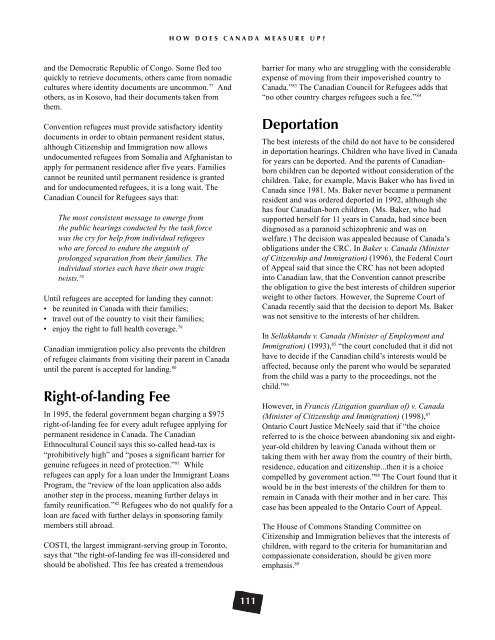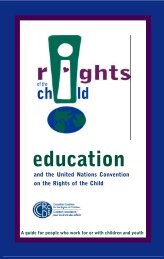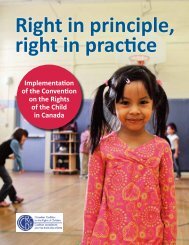Poste - Canadian Coalition for the Rights of Children
Poste - Canadian Coalition for the Rights of Children
Poste - Canadian Coalition for the Rights of Children
Create successful ePaper yourself
Turn your PDF publications into a flip-book with our unique Google optimized e-Paper software.
and <strong>the</strong> Democratic Republic <strong>of</strong> Congo. Some fled too<br />
quickly to retrieve documents, o<strong>the</strong>rs came from nomadic<br />
cultures where identity documents are uncommon. 77 And<br />
o<strong>the</strong>rs, as in Kosovo, had <strong>the</strong>ir documents taken from<br />
<strong>the</strong>m.<br />
Convention refugees must provide satisfactory identity<br />
documents in order to obtain permanent resident status,<br />
although Citizenship and Immigration now allows<br />
undocumented refugees from Somalia and Afghanistan to<br />
apply <strong>for</strong> permanent residence after five years. Families<br />
cannot be reunited until permanent residence is granted<br />
and <strong>for</strong> undocumented refugees, it is a long wait. The<br />
<strong>Canadian</strong> Council <strong>for</strong> Refugees says that:<br />
The most consistent message to emerge from<br />
<strong>the</strong> public hearings conducted by <strong>the</strong> task <strong>for</strong>ce<br />
was <strong>the</strong> cry <strong>for</strong> help from individual refugees<br />
who are <strong>for</strong>ced to endure <strong>the</strong> anguish <strong>of</strong><br />
prolonged separation from <strong>the</strong>ir families. The<br />
individual stories each have <strong>the</strong>ir own tragic<br />
twists. 78<br />
Until refugees are accepted <strong>for</strong> landing <strong>the</strong>y cannot:<br />
• be reunited in Canada with <strong>the</strong>ir families;<br />
• travel out <strong>of</strong> <strong>the</strong> country to visit <strong>the</strong>ir families;<br />
• enjoy <strong>the</strong> right to full health coverage. 79<br />
<strong>Canadian</strong> immigration policy also prevents <strong>the</strong> children<br />
<strong>of</strong> refugee claimants from visiting <strong>the</strong>ir parent in Canada<br />
until <strong>the</strong> parent is accepted <strong>for</strong> landing. 80<br />
Right-<strong>of</strong>-landing Fee<br />
In 1995, <strong>the</strong> federal government began charging a $975<br />
right-<strong>of</strong>-landing fee <strong>for</strong> every adult refugee applying <strong>for</strong><br />
permanent residence in Canada. The <strong>Canadian</strong><br />
Ethnocultural Council says this so-called head-tax is<br />
“prohibitively high” and “poses a significant barrier <strong>for</strong><br />
genuine refugees in need <strong>of</strong> protection.” 81 While<br />
refugees can apply <strong>for</strong> a loan under <strong>the</strong> Immigrant Loans<br />
Program, <strong>the</strong> “review <strong>of</strong> <strong>the</strong> loan application also adds<br />
ano<strong>the</strong>r step in <strong>the</strong> process, meaning fur<strong>the</strong>r delays in<br />
family reunification.” 82 Refugees who do not qualify <strong>for</strong> a<br />
loan are faced with fur<strong>the</strong>r delays in sponsoring family<br />
members still abroad.<br />
COSTI, <strong>the</strong> largest immigrant-serving group in Toronto,<br />
says that “<strong>the</strong> right-<strong>of</strong>-landing fee was ill-considered and<br />
should be abolished. This fee has created a tremendous<br />
H O W D O E S C A N A D A M E A S U R E U P ?<br />
111<br />
barrier <strong>for</strong> many who are struggling with <strong>the</strong> considerable<br />
expense <strong>of</strong> moving from <strong>the</strong>ir impoverished country to<br />
Canada.” 83 The <strong>Canadian</strong> Council <strong>for</strong> Refugees adds that<br />
“no o<strong>the</strong>r country charges refugees such a fee.” 84<br />
Deportation<br />
The best interests <strong>of</strong> <strong>the</strong> child do not have to be considered<br />
in deportation hearings. <strong>Children</strong> who have lived in Canada<br />
<strong>for</strong> years can be deported. And <strong>the</strong> parents <strong>of</strong> <strong>Canadian</strong>born<br />
children can be deported without consideration <strong>of</strong> <strong>the</strong><br />
children. Take, <strong>for</strong> example, Mavis Baker who has lived in<br />
Canada since 1981. Ms. Baker never became a permanent<br />
resident and was ordered deported in 1992, although she<br />
has four <strong>Canadian</strong>-born children. (Ms. Baker, who had<br />
supported herself <strong>for</strong> 11 years in Canada, had since been<br />
diagnosed as a paranoid schizophrenic and was on<br />
welfare.) The decision was appealed because <strong>of</strong> Canada’s<br />
obligations under <strong>the</strong> CRC. In Baker v. Canada (Minister<br />
<strong>of</strong> Citizenship and Immigration) (1996), <strong>the</strong> Federal Court<br />
<strong>of</strong> Appeal said that since <strong>the</strong> CRC has not been adopted<br />
into <strong>Canadian</strong> law, that <strong>the</strong> Convention cannot prescribe<br />
<strong>the</strong> obligation to give <strong>the</strong> best interests <strong>of</strong> children superior<br />
weight to o<strong>the</strong>r factors. However, <strong>the</strong> Supreme Court <strong>of</strong><br />
Canada recently said that <strong>the</strong> decision to deport Ms. Baker<br />
was not sensitive to <strong>the</strong> interests <strong>of</strong> her children.<br />
In Sellakkandu v. Canada (Minister <strong>of</strong> Employment and<br />
Immigration) (1993), 85 “<strong>the</strong> court concluded that it did not<br />
have to decide if <strong>the</strong> <strong>Canadian</strong> child’s interests would be<br />
affected, because only <strong>the</strong> parent who would be separated<br />
from <strong>the</strong> child was a party to <strong>the</strong> proceedings, not <strong>the</strong><br />
child.” 86<br />
However, in Francis (Litigation guardian <strong>of</strong>) v. Canada<br />
(Minister <strong>of</strong> Citizenship and Immigration) (1998), 87<br />
Ontario Court Justice McNeely said that if “<strong>the</strong> choice<br />
referred to is <strong>the</strong> choice between abandoning six and eightyear-old<br />
children by leaving Canada without <strong>the</strong>m or<br />
taking <strong>the</strong>m with her away from <strong>the</strong> country <strong>of</strong> <strong>the</strong>ir birth,<br />
residence, education and citizenship...<strong>the</strong>n it is a choice<br />
compelled by government action.” 88 The Court found that it<br />
would be in <strong>the</strong> best interests <strong>of</strong> <strong>the</strong> children <strong>for</strong> <strong>the</strong>m to<br />
remain in Canada with <strong>the</strong>ir mo<strong>the</strong>r and in her care. This<br />
case has been appealed to <strong>the</strong> Ontario Court <strong>of</strong> Appeal.<br />
The House <strong>of</strong> Commons Standing Committee on<br />
Citizenship and Immigration believes that <strong>the</strong> interests <strong>of</strong><br />
children, with regard to <strong>the</strong> criteria <strong>for</strong> humanitarian and<br />
compassionate consideration, should be given more<br />
emphasis. 89




